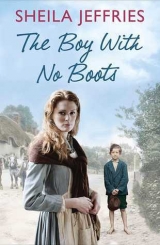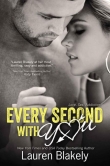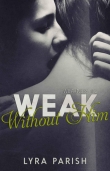
Текст книги "The Boy with No Boots"
Автор книги: Sheila Jeffries
Жанры:
Роман
,сообщить о нарушении
Текущая страница: 9 (всего у книги 16 страниц)
Chapter Thirteen
THE ‘BEE-LOUD GLADE’
‘He’s only a lorry driver, Kate,’ said Ethie spitefully, ‘I don’t see why you’ve got to have the best picnic set for HIM.’
She slammed the light brown pigskin case on the kitchen table after Kate had persuaded her to reach it down from the top shelf.
‘Thank you.’ Kate smiled disarmingly at her sister. ‘Wait ’til you’ve got a young man, Ethie. You won’t care what job he does as long as he’s kind and handsome like Freddie.’
‘Well, I shan’t fuss over any boy like you do.’
‘You’ll never get a husband with that attitude, my girl,’ said her mother, who was busy wringing sheets through an old wooden mangle, the water streaming out across the flagstone floor and into the yard.
‘Who said anything about husbands?’ retorted Ethie. ‘I shall find a husband when I’m good and ready, and he won’t be a lorry driver.’
‘Nothing so common.’ Sally winked at Kate and the two of them laughed.
Ethie’s expression darkened with jealousy. ‘Don’t you laugh at me, Kate, just ’cause you’re such a flirt, twirling your silly dress around and showing your legs. At least I’ve got some decency. If you get married before me I’ll – I’ll never speak to you again.’
‘She’s jealous. Don’t take any notice,’ said Sally as Ethie slammed out of the kitchen and marched across the farmyard sending the chickens scattering. ‘I don’t know what gets into her. You go and have a lovely picnic with Freddie, with my blessing, Kate. You deserve a day off – and so does he, I should think. You be happy while you can.’
Kate opened the picnic set which had a set of green Bakelite plates, four round mugs and a set of cutlery neatly fixed into the lid with thick leather straps and brass buckles. She sang as she made the cucumber sandwiches, cut some slices from the big pink ham which stood on a marble slab in the larder, and packed it all into the little green dishes. She cut a hunk of cheddar from the truckle, and picked some ripe tomatoes from the plant outside the sunny kitchen. A large saucepan stood on the range full of boiled milk. The cream had risen to the top and Kate took a spoon and skimmed off some of the rich yellow crust and put it in a jar. She added fresh scones and a small pot of homemade strawberry jam.
‘There. Doesn’t that look sumptuous?’
‘Mmm – I might change my mind and come with you,’ teased Sally, and Kate laughed.
‘Don’t you dare!’ she cried, rolling up the tartan picnic rug.
Sally looked at her shrewdly, thinking her vivacious daughter was too alluring for her age, especially in the new slinky dress which she’d made herself from a satiny cream fabric. It clung provocatively to her curvy body, and the neckline allowed a glimpse of her ample cleavage. As usual, Kate had trimmed it with red ribbons threaded around the sleeves and waist, tied with little bows. And she had a flashy pair of red shoes which Sally had bought for her June birthday.
‘Seriously, dear – you will be careful, won’t you?’ she said. ‘You know what I mean, Kate.’
‘Of course. Don’t you worry at all, Mother. I can look after myself Kate smiled reassuringly, and added, ‘It’s Ethie you need to worry about, not me.’
Sally nodded, staring out of the window at the sunlit yard where Ethie was heaving a straw bale into Daisy’s stable. Then she saw a cloud of dust moving along the lane in the distance.
‘Here comes Freddie. Bring him in for a cup of tea, if he wants it.’
Kate was already taking the picnic case and rug outside to the cart, which stood at the door with Polly harnessed into it. She was pawing the ground and tossing her head at bothersome flies. The cart was covered in sparrows busy pecking out grain from its cracks and corners. They flew up and settled inside the dome of honeysuckle that hung over the porch.
‘Poor Polly. I should have tied you in the shade,’ said Kate, giving the pony a cuddle. She picked some elder leaves and sprigs of lavender and stuck them in the pony’s bridle. ‘There, that’ll keep the flies away. Now you be a good girl. We’re going up the hills and there’ll be a nice cool breeze for you there – and we’re going through the shady woods. You’ll love it, Polly.’
Freddie was nervous as he slowed the lorry and approached Hilbegut Farm with care, knowing there were always ducks or sheep pottering about. It felt strange, having what Kate called ‘a day off’. He couldn’t remember the last time he’d had a whole day without working, and he felt oddly furtive about it, especially as Annie had said proudly, ‘I never had a day off in my life, and neither did your father, or his father before him.’ Then she’d added, ‘I don’t know how I’m going to manage all day on my own, I hope I don’t have to go out.’
The guilt felt heavy like a yoke across his shoulders, but a tingle was in his soul. A whole day out with Kate was more than he could have dreamed about. Freddie felt apprehensive too. A picnic, she’d said, and her eyes had lit up like stars, so he’d agreed to go. He didn’t know what a picnic was, so he’d asked Herbie.
Herbie had snorted. ‘Picnics!’ he’d said. ‘I think picnics are an abomination.’
‘Why? What do you do on a picnic?’
‘You have to eat your dinner sitting on some outlandish place by the river or up some hillside. It’s always too flaming hot and you end up getting stung by a wasp or getting ants in your pants.’
Herbie had laughed his wheezy laugh then and disappeared into his dust-covered workshop. ‘Oh yes – picnics are an abomination.’
So Freddie was even more apprehensive. He hoped he wouldn’t have to dance. Kate had told him she loved dancing, and it worried Freddie. He’d never danced in his life and didn’t know how. He parked the Scammell lorry and rather awkwardly picked up the bouquet of six red roses. Annie had made it for him, cutting them from the garden and making a posy with some green leaves and a few white and purple Sweet Williams round the outside. She’d grumbled all the time, but Freddie could tell she was enjoying it as he watched her fold a cone of bread paper around the posy and tie it with a strip of ribbon.
He walked across to the cart holding the posy behind his back. Kate turned, and when he saw her radiant smile he felt welcome, and he felt life and energy flood into him.
‘You’re holding something, Freddie!’ she cried and he whipped the bouquet out and gave it to her.
‘Here you are. I brought you some roses.’
‘Oooh – Freddie!’ Kate buried her face in the bouquet and breathed its fragrance. Then she looked up straight into his eyes. ‘That’s beautiful. Oh, aren’t they beautiful? Thank you!’
Soon they were heading across the peat moors towards the blue-green ridge of the Polden Hills, with Polly trotting smartly along the narrow lane bordered by deep ditches and pollarded willows. Kate held the reins attentively and Freddie felt redundant, as if he suddenly didn’t know what to do with his hands. He wasn’t used to being a passenger, and he could scarcely believe that he was sitting next to the beautiful girl who had chosen to go on a picnic with him. They weren’t going fast, yet he felt he was flying through the diamond summer, the grass and the willow leaves sparkling and the sun flashing over the brown water.
Kate began to sing, and Polly flicked her ears back to listen, and her hoof beats clip-clopped to the music. When she started on ‘Danny Boy’, Freddie found himself joining in, surprised by the new depth and texture of his voice, and surprised at the joy it gave him and the feeling of camaraderie with Kate.
But when they reached the woods at the foot of the hills, a different feeling lulled them into silence. Polly slowed to a walk as they entered the luminous green flickering twilight, the beeches, limes and oaks towering like the pillars of a temple. Cool and smelling sweetly of leaves and moss, the woods whispered around them, Polly’s hoof beats were muffled and the wheels of the cart crackled softly on the pink brown layer of calyx fallen from buds and blossom.
‘Stop,’ said Freddie suddenly.
Kate glanced at him, her startled eyes bright in the shadowy wood. She pulled Polly’s reins gently and the pony stopped and stood motionless, listening, the cart creaking a little as the wheels became still.
‘What is it?’ Kate asked in a whisper.
‘Listen!’ said Freddie in an electrifying tone.
Kate froze and they were totally still together. They were in a wide glade surrounded by trees, the ground thickly covered in the stripy leaves and black seed-heads of dead bluebells. The sound of the glade filtered into Freddie’s consciousness, stirring a distant memory. Above the clink of Polly’s harness and the occasional chuck-chuck of the woodpeckers, was a humming, droning sound, at first high among the leaves, then close, then distant again. He looked deep into the woodland flora and saw the sunlight glisten on the zig-zagging bodies of dozens of bees. Honeybees, bumbles and tiny hoverflies, and the bright gold of a queen hornet buzzing through the nettles and campion.
He looked at Kate and her face was like that of a startled child, listening to the unexpected symphony of silence.
‘The bees,’ whispered Freddie. ‘Can you hear them?’
She nodded, her mouth open in surprise, and the sunlight glinted through the trees onto her cream silk dress and the gloss of her dark hair.
‘Magic,’ she whispered.
They listened together.
‘It’s the bee-loud glade,’ whispered Freddie. ‘From Innisfree.’
‘What?’
‘It’s a poem I used to like.’
‘Ooh – tell me. I want to hear it.’
Freddie hesitated, embarrassed. And as soon as the embarrassment came, the magic disappeared and the bees melted away into the emerald light.
‘Why are we whispering?’ whispered Kate and her eyes danced with amusement. Polly gave a reverberating whinny, her harness jingled and the cart trembled and creaked. Kate broke into one of her peals of laughter. She picked up the reins again and Polly moved on, up the sloping lane through the shady wood.
‘You’re going to tell me that poem, when we’re having our picnic,’ Kate said bossily. ‘I shan’t let you have one of my cucumber sandwiches until you’ve told me.’
The spell was broken, but Freddie felt as if she had opened a door to a part of his mind that had lain forgotten for years. Hearing the bees, then the sound of Kate’s bell-like laughter ringing through the woods, he felt a sense of restored happiness, a wild precious freedom he’d only experienced with Granny Barcussy.
Kate pulled Polly to a halt again.
‘We must walk with her from here, Freddie,’ she said. ‘It’s too steep for her to pull us as well.’
They plodded one on each side of Polly as the gradient increased and the ground wound upwards into the hills. At every bend the view across the Somerset Levels grew bluer and more panoramic, the tall trees gave way to dense hazel copses, gnarled hawthorn bushes and field maples festooned with bunches of pale green winged seeds. Freddie was quiet, feeling he wanted to drink deeply of the beauty around him, and Kate chattered like a bubbling stream. Only when he linked his index finger with hers in Polly’s hot mane did she become quiet. The touch was charged with a gentle energy like the tip of a candle flame which had the potential to ignite into a hungry fire.
Finally they reached the top of the Poldens, the lane undulating into the distance. Kate steered Polly through a gap in the hedge. She unhitched her from the cart and tied her under the shade of an oak tree.
‘Now for the best bit,’ she said, her eyes shining. ‘Let’s walk up the ridge and see the view. Then we’ll choose a place for our picnic’
Before them stretched a ridge of hill against the sky. Freddie and Kate walked up towards it, winding their way through enormous anthills, patches of wild thyme, and domes of yellow trefoil.
‘Tom Thumbs,’ said Kate, picking one of the tiny pea-like flowers, ‘– and ORCHIDS! Look Freddie – orchids. They smell divine.’
‘Butterfly orchids,’ said Freddie. ‘That’s what those white ones are – and look, here’s a bee orchid.’ He bent to touch the complex flower which had a petal resembling a small bumblebee.
Kate looked at him in surprise.
‘Fancy you knowing that, Freddie.’
‘I grew up in the country, not far from here,’ he said. ‘And I had a granny who taught me a lot about nature, and what she didn’t teach me, I learned from watching. I know all these butterflies.’
‘I thought you only loved engines,’ said Kate. ‘You never told me.’
‘Well,’ Freddie considered what he wanted to say, and decided against it. He didn’t want to risk upsetting her.
She looked up at him with a searching, caring gaze. ‘Oh dear,’ she said. ‘I’ve done all the talking, haven’t I? I know I’m a chatterbox but I do want to know about your life, and your hopes and dreams, Freddie – oh, don’t look so serious! Come on, I’ll race you up to the ridge.’ She kicked off her red shoes and ran, grinning wickedly back at him, her hair and dress flying.
Freddie watched the two red shoes land far apart in the grass, then he ran after her in long strides, the money jingling in his pockets. He felt like an old man who wasn’t used to running, and he felt like a young man who hadn’t discovered himself. As soon as Kate heard his big creaky shoes thudding after her and his pockets jingling, she started to giggle.
It was like running up to the sky, being an aeroplane that could reach the ridge and take off into the air. At the top Kate stretched her arms, twirled around and stood barefoot, waiting for him.
‘I love it up here,’ she cried. ‘Look at this view.’
The vast landscape stunned them both into silence, even distracting Freddie from wanting to stare at Kate who looked so free and alive standing beside him with her bare toes in the wiry grass.
‘That’s Glastonbury Tor,’ she said pointing to a steep green mound with a tower at the top. ‘And the Mendips. Don’t they look blue? Turquoise blue like a peacock.’
The Levels stretched below them like a chessboard of black peat fields and hay meadows of buttercup and sorrel, the rhynes shining silver, on and on into the distance where a tiny steam train was puffing its way along the track from Glastonbury to Burnham-on-Sea.
‘What are those hills down there?’ asked Freddie, pointing south.
‘The Quantocks,’ said Kate. ‘And Exmoor beyond. Then you can nearly see the sea at Burnham, the Bristol Channel and sometimes you can see into WALES and see the MOUNTAINS.’
Freddie kept quiet. He’d never seen the sea, or a mountain. Kate knew a lot more than he did about their own land. Did it matter? No, he reasoned. He loved Kate, and he hoped that one day she would love him, but while that love was growing he felt he had to be quiet and respectful. He’d heard other men boasting and laughing about what they had done with girls. It sickened Freddie, and so did the girls he saw wearing lipstick and strutting around in silly clothes, or dressing up in breeches and boots, riding motorbikes, smoking fags. Kate was like a secret jewel he had discovered, he was going to keep her close to his heart, and under wraps.
It occurred to him that he hadn’t given her a compliment yet, so he opted for a safe one. ‘That’s a beautiful dress you’re wearing.’
‘I’m glad you like it. I made it myself,’ explained Kate, sitting down on the soft grass and leaning back on both arms. She looked at him expectantly. ‘Now – I want to hear that poem.’
‘Do you? What do you want to hear that for?’
‘Please,’ she pleaded.
So Freddie recited ‘The Lake Isle of Innisfree’, his quiet voice shaking a little with emotion, especially when he came to the last verse.
‘I can see it means a lot to you,’ said Kate. ‘I’m not very good at poetry so can you explain it to me?’
‘Well – I’ll try to.’ Freddie stared out across the Levels, gathering words from corners of his childhood, the beechnuts, the gleaned barley grains, the broken china. ‘When I was a boy I never had time to play. We were poor. I had to walk a mile to school and a mile home in a pair of wooden clogs, and when I got home I had to run errands for my mother – she couldn’t go out, see? And I was always hungry, I used to live on beechnuts and hazelnuts, like a squirrel I was.’
Kate’s eyes were wide and solemn, her mouth open as she listened to his story, so different from her own.
‘Then, when the war ended, Dad bought the bakery in Monterose. He wanted me to be a baker, see? He thought that would be a fine life for me. But – I didn’t want it, and I had to do it, Kate. Can you understand that?’ He paused, reassured by the way she was listening so attentively. ‘Then for the rest of my life I had to get up at five in the morning, every morning, help make the bread, then load it into the bike and do the delivery round, all that before school – oh and I used to go down the station to carry luggage – so that poem, where it says “I shall have some peace there,” and “live alone in the bee-loud glade”, it used to give me peace, just saying it, or thinking it. When we moved to Monterose, I missed the countryside, but no one ever knew that. I never told anyone. But that last verse, about “standing on the pavements grey” and “feeling it in the deep earth’s core” – I understood that feeling so well . . .’
‘Oh Freddie.’ Kate reached out and touched the back of his wrist, looking into his face with compassion. ‘Go on.’
‘’Tis a miserable story,’ Freddie said, suddenly afraid that he had caused a cloud to drift over their summer picnic. ‘You don’t want to hear all that.’
‘I do,’ said Kate, and her eyes never left his face.
‘Well – I’m coming to a better bit now.’ Freddie remembered the storytelling tradition in his family, the exaggerations, the silences, and the laughter. He wanted to do that for Kate, turn his miserable tale into something entertaining and positive. ‘I’ll tell you how I got that lorry. Well, one frosty night in the middle of February – hard as diamonds the frost was – I gets up, quiet as a mouse . . .’
Kate sat spellbound, not moving a muscle as she listened to his story, holding her breath in the silences. She let go of Freddie’s wrist so that he could gesticulate with his long fingers, his eyes beginning to twinkle, his voice still slow and quiet. Then he came to the part where he had escaped down the steep dark street on his bike.
‘The bike had no brakes, see? So I went whizzing down there, in the pitch dark, with my legs stuck out straight and sparks flying from my boots . . .’
He was rewarded with a scream of laughter. Kate doubled over, clutching her stomach with one hand and wiping her eyes with the other. She laughed and laughed as if she would never stop, and Freddie managed to stay po-faced.
‘Well ’tis true,’ he said, and that set her off again. Secretly pleased, he continued his story, restraining himself from smiles as he related how he had paid his money into the bank.
‘As soon as the doors opened, I went in with my flour sack, dragging it along the floor. Then I stood at the counter taking out the old socks full of money and some of them blue and mouldy, and the hankies, all dusty they were and bursting with coins. And the bank clerk, he didn’t like it. He looked me up and down as if I was a tramp, and he said, “You can’t bring that dirty old stuff in here.” So I looked him in the eye and said – quite politely – “Excuse me Sir, but I can, I’m sixteen and this is legal tender,” and he didn’t like it, but he had to count it all. Took him three quarters of an hour jingling and cussing, and there was a queue behind me right out the door, and they were all grumbling. But I had the last laugh. I came out of there with my money in crisp new bank notes, then I went flying down to the motor yard on me bread bike, and I had that Scammell lorry.’
He paused to take a breath, and saw that Kate was wanting to say something.
‘What a WONDERFUL story, Freddie,’ she said passionately, ‘so funny, and inspiring. Tell me again. I loved it.’
‘Well ’tis true. True as I’m sitting here,’ said Freddie, and his smile stretched right to the edges of his face.
‘I love to see you smile,’ said Kate and she kissed him impulsively on his smiling cheek.
Startled and moved by her response, Freddie slipped his arm around her shoulders, feeling the silky dress and her warmth underneath, and she put her hand on his shoulder. For a moment they were both still, feeling each other’s heartbeat, and Freddie buried his chin in the soft lustre of her dark hair. The moment filled with light and stretched into infinity as if it had registered in some ethereal archive.
He held her in a shell-like hug, afraid of his own strength and of the sudden rush of energy through his body. His pulse wanted to race like a wild horse, yet his mind stayed calm, his inner voice telling him to slow down and savour the intoxicating feel of her satin dress, the way her dark curls were hot from the sunshine as they slipped over his bare arm.
‘This is only the beginning,’ he heard himself whisper, but he held back from speaking the words that echoed in his heart, words that Granny Barcussy had fed into his soul. ‘When you love, you must love wisely and slowly.’ Nothing in his life had felt so exquisitely precious as the warm bright silk of Kate in his arms.
A flock of small birds came bobbing and bouncing out of the woods, their voices tinkling like bells, and the grass around them came alive with fluttering wings.
‘Goldfinches,’ whispered Freddie.
But Kate was listening to something else.
‘I can hear your tummy rumbling,’ she said, laughing, and sat up. The goldfinches vanished with a burr of wings. ‘I think it’s time for our DELICIOUS picnic.’








